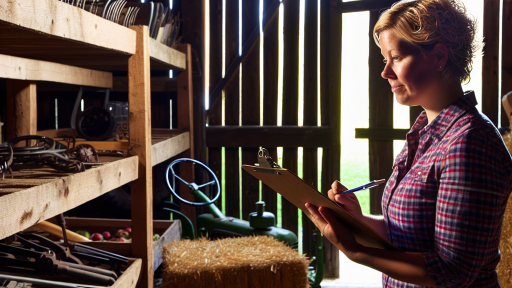Creating a Pick-Your-Own Produce Experience
Engaging Customers in the Harvest
Creating a pick-your-own produce experience attracts local families to your farm.
This interactive activity allows customers to harvest fruits and vegetables directly.
Additionally, it fosters a strong connection between consumers and sustainable farming.
Choosing the Right Produce
Selecting the best crops is essential for a successful pick-your-own program.
Fruits like strawberries, blueberries, and apples are popular and accessible.
Vegetables such as tomatoes, cucumbers, and peppers also engage visitors.
Setting Up Your Farm for Visitors
Prepare your farm by creating clear signage to direct customers.
Designate specific areas for each type of produce to avoid confusion.
Ensure you provide proper tools, like baskets or bags, for easy harvesting.
Creating a Welcoming Atmosphere
Decorate your farm with vibrant colors to enhance the experience.
Offer shaded areas where customers can relax during their visit.
Set up picnic spots for families to enjoy their harvest after picking.
Marketing Your Experience
Marketing effectively reaches potential customers and increases attendance.
Utilize social media platforms to showcase your farm’s charm and offerings.
Organize local events that highlight your pick-your-own experience.
Transform Your Agribusiness
Unlock your farm's potential with expert advice tailored to your needs. Get actionable steps that drive real results.
Get StartedBuilding Partnerships
Collaborate with local schools to create educational field trips.
Engage with nearby restaurants to promote farm-fresh produce usage.
These partnerships can expand your reach within the community.
Enhancing Customer Experience
Provide educational signage about each crop’s growing process.
Hosting workshops on canning and preserving can enrich the visit.
Consider offering seasonal activities, like pumpkin picking in autumn.
Collecting Feedback
Encourage visitors to share their experiences through surveys or reviews.
This feedback helps you improve the experience for future customers.
Moreover, it fosters a sense of community among your patrons.
Farm Tours: Educational Experiences that Highlight Farming Practices and Sustainability
Farm tours provide visitors with unique educational experiences.
They showcase diverse farming practices and promote sustainability.
Visitors gain insight into the agricultural process and its benefits.
Types of Farm Tours
There are various types of tours available for visitors.
- Guided tours offer structured learning experiences.
- Self-guided tours allow visitors to explore at their own pace.
- Special events, such as harvest festivals, enhance visitor engagement.
Educational Components of Farm Tours
Farm tours often include educational modules for visitors.
- Interactive demonstrations can teach sustainable farming techniques.
- Workshops may cover topics like organic farming and crop rotation.
- Children’s activities engage younger audiences in agriculture.
Promoting Sustainability
Farm tours emphasize the importance of sustainable practices.
This helps visitors understand their impact on the environment.
Additionally, tours highlight success stories in sustainable agriculture.
Enhancing Visitor Experience
To enhance the experience, consider offering local produce tastings.
Farmers can provide samples of fruits and vegetables grown on-site.
Moreover, inviting local artisans to showcase their crafts can add value.
Marketing Your Farm Tours
Effective marketing strategies boost awareness of farm tours.
- Utilizing social media platforms can reach a wider audience.
- Collaborating with local tourism boards increases visibility.
- Offering promotions can attract first-time visitors.
Feedback and Improvement
Gathering feedback is crucial for enhancing tour offerings.
Surveys can provide insights on visitor preferences and experiences.
Implementing changes based on feedback can lead to better tours.
Showcase Your Farming Business
Publish your professional farming services profile on our blog for a one-time fee of $200 and reach a dedicated audience of farmers and agribusiness owners.
Publish Your ProfileSeasonal Festivals: Celebrating Harvests with Community Events and Local Products
Promoting Community Engagement
Seasonal festivals create an opportunity for community engagement.
They bring together local families and visitors for a shared experience.
Moreover, these events foster a sense of belonging among participants.
Showcasing Local Produce
One key feature of these festivals is showcasing local produce.
Farmers can present their harvests directly to consumers.
This connection builds trust and appreciation for local agriculture.
Organizing Fun Activities
Festivals should include fun activities for all ages.
Consider adding games, live music, and educational workshops.
These attractions will enhance the festival experience for visitors.
Collaborating with Local Businesses
Collaboration is essential to maximize the festival’s impact.
Partner with local businesses to offer food, crafts, and entertainment.
This strategy not only supports local enterprises but also enriches the event.
Advertising and Promotion
Effective advertising boosts attendance and participation.
Utilize social media platforms to reach a wider audience.
Additionally, consider distributing flyers in local hotspots.
Gathering Feedback for Improvement
After each festival, gather feedback from participants.
This step helps identify strengths and areas for improvement.
Incorporating suggestions will enhance future events significantly.
Uncover the Details: Enhancing Customer Experience in Farm Sales
Workshops and Classes: Teaching Skills from Gardening to Cooking Using Farm Produce
Workshops and classes provide a unique opportunity to engage visitors.
They can learn practical skills related to farming and food preparation.
Start by focusing on gardening workshops.
Gardening classes can cover essential topics like planting and maintenance.
To enhance the experience, offer hands-on activities.
Participants enjoy getting their hands dirty in the soil.
These experiences foster a deeper connection to the food they eat.
Next, consider cooking classes using farm produce.
These sessions can highlight seasonal ingredients from the farm.
Teach participants how to prepare delicious meals at home.
Invite local chefs to lead cooking demonstrations.
They can share valuable tips and techniques with the attendees.
Additionally, offer specialized workshops focusing on preserving food.
These can include canning, pickling, and fermenting workshops.
Participants learn how to extend the life of their harvests.
Furthermore, consider themes for your classes.
Seasonal themes engage participants all year round.
For example, you might focus on summer berry jams or winter squash dishes.
Promote these workshops through social media and local networks.
This way, you can attract diverse groups of participants.
Furthermore, collaborations with local schools can be beneficial.
Showcase Your Farming Business
Publish your professional farming services profile on our blog for a one-time fee of $200 and reach a dedicated audience of farmers and agribusiness owners.
Publish Your ProfileStudents can learn about agriculture and sustainability first-hand.
Incorporating children can create family-friendly activities.
This not only increases participation but builds community relationships.
As a result, you inspire the next generation of farmers and chefs.
Always gather feedback to improve your offerings.
This helps tailor future workshops to meet participants’ needs.
Lastly, consider creating an online platform for virtual workshops.
Online classes can reach a broader audience beyond your local area.
This flexibility accommodates those unable to attend in person.
With these strategies, you can boost attendance and sales effectively.
See Related Content: Community Supported Agriculture for Small Farmers
Farm-to-Table Dining Experiences
Creating Unique Partnerships
Forming partnerships with local chefs enhances your dining experience.
Chefs bring creativity and expertise to your farm’s offerings.
They can design menus that highlight seasonal ingredients from your farm.
This collaboration fosters a deeper connection with your produce.
Additionally, it attracts food enthusiasts eager to dine locally.
Designing Memorable Events
Hosting special dining events can captivate your audience.
Consider seasonal festivals that celebrate harvests and culinary arts.
Invite chefs to lead interactive cooking demonstrations.
Guests love engaging with chefs while learning about ingredient sources.
Providing a unique setting adds to the overall experience.
Marketing Your Farm-to-Table Experience
Promote your dining events through social media and local networks.
Highlight the benefits of farm-fresh ingredients and sustainability.
Share vivid images of the dining experience to entice potential guests.
Collaborate with food bloggers and influencers for broader reach.
Encourage word-of-mouth marketing by offering exceptional service.
Feedback and Continuous Improvement
Gather feedback from guests after dining events.
Use surveys or informal discussions to gauge their experiences.
This information can guide future menu developments.
Consistently seeking improvement ensures your offerings remain attractive.
Moreover, it builds a loyal customer base eager to return.
Explore Further: Sustainable Livestock Management Tips

Agricultural Retreats: Offering Overnight Stays for Relaxation and Learning on the Farm
Creating a Peaceful Environment
Agricultural retreats provide a tranquil escape from urban life.
Farm settings offer fresh air and beautiful landscapes.
Guests can unwind in nature while enjoying the farm’s beauty.
Designing cozy accommodations enhances the retreat experience.
Prioritize comfortable beds and inviting decor for a welcoming atmosphere.
Educational Workshops and Activities
Workshops become a key component of agricultural retreats.
Hosting classes on sustainable farming techniques attracts interested guests.
Integrate hands-on activities such as planting or animal care.
Showcase Your Farming Business
Publish your professional farming services profile on our blog for a one-time fee of $200 and reach a dedicated audience of farmers and agribusiness owners.
Publish Your ProfileHolistic wellness sessions can be beneficial as well.
Consider yoga classes or cooking demonstrations with farm-fresh ingredients.
Culinary Experiences
Farm-to-table dining elevates the retreat experience.
Highlight seasonal ingredients sourced directly from the farm.
Offer cooking classes led by skilled chefs or local culinary experts.
Encourage guests to participate in meal preparation for deeper engagement.
Dine under the stars for a unique and memorable atmosphere.
Marketing Your Retreat
Effective marketing strategies can boost visibility.
Utilize social media platforms to share stunning visuals of the retreat.
Create captivating content through blogs or newsletters.
Collaborate with local influencers to reach wider audiences.
Offer special promotions during the off-peak season for added interest.
Building Community Engagement
Engagement fosters a sense of belonging among guests.
Invite local artisans to showcase their crafts during retreats.
Organize community events to draw in visitors from nearby areas.
Establish partnerships with local businesses for mutual benefits.
Encouraging feedback helps improve future retreats and strengthen ties.
You Might Also Like: Soil Health Management for Small-Scale Farmers
Showcasing Livestock: Interactive Experiences with Animals and Understanding Their Care
Creating Memorable Experiences
Engage visitors with hands-on experiences on your farm.
Offer opportunities to feed and interact with animals.
Consider organizing guided tours led by knowledgeable staff.
Ensure every tour includes educational talks about animal care.
Invite guests to experience farm chores like milking or grooming.
Enhancing Visitor Understanding
Provide workshops focused on animal husbandry practices.
Utilize demonstrations to showcase animal health checks.
Incorporate talks about the importance of proper nutrition.
Encourage questions to foster a learning atmosphere.
Implementing Interactive Activities
Create interactive stations for children and adults alike.
- Set up a petting area with friendly animals.
- Establish a “build-a-barn” activity for creativity.
- Organize contests for best animal care practices.
Additionally, offer virtual reality experiences for remote guests.
These activities make learning about farming exciting.
Promoting Animal Welfare
Communicate your commitment to animal welfare effectively.
Highlight sustainable farming practices during tours.
Feature stories about rescue animals and their journeys.
Incorporate testimonials from animal care experts.
Encourage discussions about ethical farming practices.
Collaborating with Local Artisans
Creating Craft Fairs
Host craft fairs on your farm to attract visitors.
These events showcase local artisans and their unique creations.
Participating artisans can promote their goods while enhancing your farm’s visibility.
Collaboration strengthens community ties and fosters local engagement.
Consider scheduling events during peak harvest seasons for maximum attendance.
Showcase Your Farming Business
Publish your professional farming services profile on our blog for a one-time fee of $200 and reach a dedicated audience of farmers and agribusiness owners.
Publish Your ProfilePromoting Local Markets
Set up a weekly local market at your farm.
This initiative allows local farmers and artisans to sell their products directly.
Offer a variety of goods such as fresh produce, handmade crafts, and baked items.
Encourage customers to support local businesses while enjoying farm-fresh offerings.
Highlight the benefits of buying locally during your market promotions.
Workshops and Demonstrations
Offer workshops led by local artisans to educate visitors.
These can include pottery, weaving, or cooking classes.
Engaging demonstrations foster a deeper appreciation of handmade goods.
Your farm becomes a hub for creativity and connection within the community.
Workshop participants are likely to share their experiences, boosting your farm’s exposure.
Partnerships with Local Organizations
Collaborate with local organizations to host community events.
Partnering with schools or nonprofits can widen your audience reach.
Invite local musicians or performers to enhance the atmosphere.
These partnerships create diverse experiences that appeal to various demographics.
Emphasizing community involvement showcases your farm’s commitment to local culture.
Additional Resources
Developing a Successful Agritourism Business in Oregon | OSU …
Understanding the Benefits of Agritourism – Solimar International %




